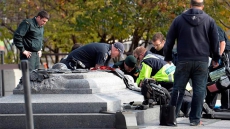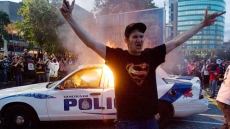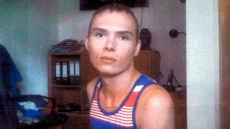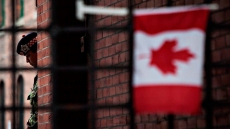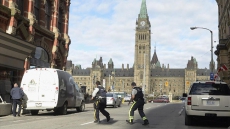CALGARY — Vincent Li, Trevor Kloschinsky, Christopher Husbands, Guy Turcotte and Luka Magnotta are at the centre of some of the most horrific crimes in Canada.
All were arrested for brutal killings and all entered not criminally responsible defences during their murder trials.
And while that defence has been tied to some high profile cases of late, legal and psychiatric experts say its use is no more prevalent than it was in the past. They say it's the severity of the cases and public awareness that has pushed it into the headlines.
"It's a statistical blip that we just had maybe one or two cases that captured the public's imagination and then people paid more attention to them after that," says Dr. Graham Glancy, an Ontario psychiatrist who was called to testify in the Karla Homolka-Paul Bernardo murder cases and who consults for the Ontario Ministry of Corrections. "The press is paying more attention and it becomes a more major issue."
He says a not criminally responsible defence isn't something that defence lawyers take lightly. If the crime isn't violent, for example, an offender could end up spending more time incarcerated than if they go through a regular trial.
"I think defence lawyers are very sensitive to the rights of their clients and getting somebody involved in the system is somewhat restrictive to the client. They're going to be in treatment for a long time," Glancy says.
Once known as not guilty by reason of insanity, the plea was put into Canada's first Criminal Code in 1892 based on the British Criminal Lunatics Act dating back to 1800. There were no time limits for the review of an individual’s case and no criteria for release from the hospital or asylum.
In 1969, Parliament added provisions to the Criminal Code encouraging provincial lieutenant governors to receive expert recommendations before making decisions about whether individuals should remain in custody for treatment.
It was changed to not criminally responsible by reason of a mental disorder in 1992 to bring it line with the Charter of Rights and Freedoms in that everyone has the right not to be arbitrarily detained or imprisoned.
Veteran Calgary defence lawyer Alain Hepner successfully defended Derek Puffer this year in the deaths of his parents, popular Calgary sportscaster Billy Powers and his wife Donna Lee. Puffer was suffering from severe schizophrenia and was in a psychotic state when he went into his parents room and stabbed them.
Hepner says going with an not criminally responsible defence is something he has to think long and hard about.
"I think they're as infrequent as they always have been. A lot of people may think that there's an NCR pending but you really have to dig deep and see what the symptoms are," says Hepner, who has been practising law since the 1970s.
"I have to investigate observations by family members, friends, neighbours, etc. before I can be satisfied that I can advance NCR. You've got the psychopaths that aren't NCR and they're just devoid of feeling or emotion when they kill people."
Balfour Der, a Calgary defence lawyer and a former Crown prosecutor, says the defence is still rare and he's only handled a few cases in the past 30 years.
"We hear more about these offences now but in the past if someone's client was facing murder they would have exhausted all avenues. I don't think it's a recent concoction, if I can put it that way," Der says.
"If you're facing a murder charge and life imprisonment I think it's an easier decision to make. You would be quicker to go ahead with an NCR with the severity of the punishment."
There is a public perception that individuals who are found not criminally responsible are not being punished for their crimes.
Vince Li, who beheaded a fellow passenger on a Greyhound bus in Manitoba in 2008, was granted unescorted trips from the Selkirk Mental Health Centre by a review board last February.
It prompted the federal government to implement the Not Criminally Responsible Reform Act which is billed as making public safety a primary consideration and providing victims with a stronger voice in the process.
Glancy says those who are hospitalized in NCR cases receive what he calls the "platinum program for mental health," with both psychological and pharmacological treatment.
"He's not going to walk scot-free. He's going to go to a maximum or medium secure hospital which is going to very carefully, with the oversight of a judicial board, gradually cascade him to the community," Glancy says.
"There are checks and balances all along the way. It's only when they reach those goals and it's absolutely clear they are no threat to the public they get an absolute discharge."
Der says there is the public perception that individuals are "getting away with murder," but that isn't true.
"They don't appreciate that the person isn't getting out. The person isn't just getting off. They're going to be institutionalized ... they're going to be held captive in a secure facility," Der says.
"It's a legitimate defence that should be there because there are people who suffer from mental illness who commit offences they otherwise wouldn't have done."mjl-
